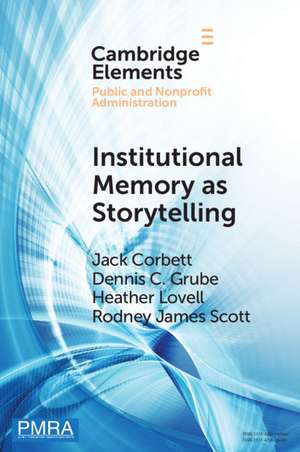Institutional Memory as Storytelling: How Networked Government Remembers: Elements in Public and Nonprofit Administration
Autor Jack Corbett, Dennis Christian Grube, Heather Caroline Lovell, Rodney James Scotten Limba Engleză Paperback – 23 dec 2020
Din seria Elements in Public and Nonprofit Administration
-
 Preț: 78.55 lei
Preț: 78.55 lei -
 Preț: 129.70 lei
Preț: 129.70 lei -
 Preț: 78.65 lei
Preț: 78.65 lei -
 Preț: 129.55 lei
Preț: 129.55 lei -
 Preț: 129.45 lei
Preț: 129.45 lei -
 Preț: 129.68 lei
Preț: 129.68 lei -
 Preț: 143.76 lei
Preț: 143.76 lei -
 Preț: 141.84 lei
Preț: 141.84 lei -
 Preț: 143.16 lei
Preț: 143.16 lei -
 Preț: 144.34 lei
Preț: 144.34 lei -
 Preț: 144.51 lei
Preț: 144.51 lei -
 Preț: 143.97 lei
Preț: 143.97 lei -
 Preț: 142.61 lei
Preț: 142.61 lei -
 Preț: 143.16 lei
Preț: 143.16 lei -
 Preț: 129.55 lei
Preț: 129.55 lei -
 Preț: 143.97 lei
Preț: 143.97 lei -
 Preț: 143.00 lei
Preț: 143.00 lei -
 Preț: 144.14 lei
Preț: 144.14 lei -
 Preț: 143.59 lei
Preț: 143.59 lei -
 Preț: 143.59 lei
Preț: 143.59 lei -
 Preț: 143.59 lei
Preț: 143.59 lei -
 Preț: 142.23 lei
Preț: 142.23 lei -
 Preț: 144.14 lei
Preț: 144.14 lei -
 Preț: 143.76 lei
Preț: 143.76 lei -
 Preț: 144.51 lei
Preț: 144.51 lei -
 Preț: 143.16 lei
Preț: 143.16 lei -
 Preț: 143.76 lei
Preț: 143.76 lei -
 Preț: 143.00 lei
Preț: 143.00 lei -
 Preț: 143.97 lei
Preț: 143.97 lei -
 Preț: 143.76 lei
Preț: 143.76 lei -
 Preț: 129.60 lei
Preț: 129.60 lei -
 Preț: 143.92 lei
Preț: 143.92 lei -
 Preț: 129.29 lei
Preț: 129.29 lei -
 Preț: 129.36 lei
Preț: 129.36 lei
Preț: 143.00 lei
Nou
Puncte Express: 215
Preț estimativ în valută:
27.37€ • 29.72$ • 22.99£
27.37€ • 29.72$ • 22.99£
Carte tipărită la comandă
Livrare economică 22 aprilie-06 mai
Preluare comenzi: 021 569.72.76
Specificații
ISBN-13: 9781108748001
ISBN-10: 1108748007
Pagini: 75
Dimensiuni: 230 x 150 x 5 mm
Greutate: 0.12 kg
Editura: Cambridge University Press
Colecția Cambridge University Press
Seria Elements in Public and Nonprofit Administration
Locul publicării:Cambridge, United Kingdom
ISBN-10: 1108748007
Pagini: 75
Dimensiuni: 230 x 150 x 5 mm
Greutate: 0.12 kg
Editura: Cambridge University Press
Colecția Cambridge University Press
Seria Elements in Public and Nonprofit Administration
Locul publicării:Cambridge, United Kingdom
Cuprins
1. Introduction; 2. Whole of government processes and the creation of collective memories: the case of the Tasmanian Family Violence Action Plan; 3. What happens with iterative conversations in cases of policy failure: the State of Victoria's smart metering program, Australia; 4. Differentiated memories: the case of the UK's Zero Carbon Hub; 5. Living Memories: the case of the New Zealand justice sector; 6. Conclusion.
Descriere
When institutions forget they repeat mistakes. This Element explains why institutional memory is important and how it can be improved.
